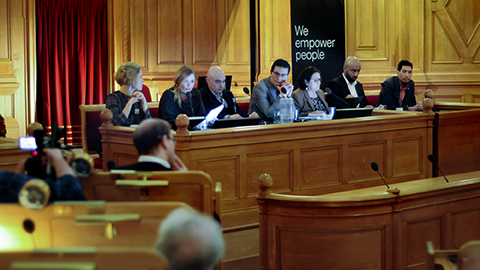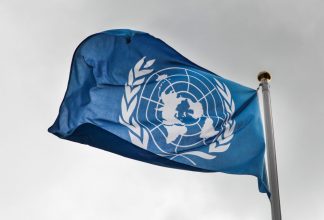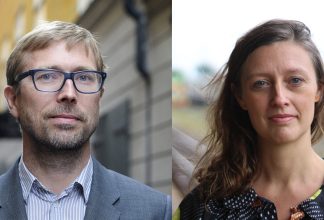UN’s Criticism of Sweden Highlighted During Seminar in Parliament

Racism and discrimination continues to be some of the most significant human rights problems in Sweden, which became clear after the United Nations Human Rights Council (UNHRC) reviewed Sweden on January 26. The review of Sweden takes place every four years under the Universal Periodic Review, UPR.
To discuss the issues that arose from the UPR review in Geneva and how Sweden should work to comply with the recommendations given by the UN, Civil Rights Defenders invited guests to a seminar at the Swedish Parliament on February 02. Six experts, representing different minority groups and sectors within civil society, participated on the panel and expressed their views on the most serious problems affecting minority rights.
To address the current problems the UNHRC recommended that Sweden improve its strategies when it comes to the discrimination faced by vulnerable groups. Sweden should take concrete action to stop the harassment of the Muslim community and to ensure the inclusion of Roma and Afro-Swedes in society.
Sweden should also strengthen its efforts to combat hate crimes, a proposal which was welcomed by all of the seminar participants. Very few reports of hate crimes have led to prosecution and conviction as Yasri Khan, official Spokesperson of Swedish Muslims for Peace and Justice, pointed out. Yasri also stated the need for specially trained staff both within the police and the courts to strengthen the judicial system. Discrimination expert Irene Molina also stressed that the problems of discrimination are structural and permeates throughout society as a whole. According to Irene, it does not suffice in itself to single out certain individuals for the situation to change.
Out of all hate crimes reported, the crimes against Roma are those which receive the least attention from Swedish authorities. According to Rosario Taikon, from Sensus Study Association, this is a vicious spiral. The fact that so few crimes are investigated has led to a complete lack of confidence in the judicial system, resulting in a situation where few from the Roma community will actually choose to report hate crimes. Rosario stressed that the Equality Ombudsman (DO) plays an important role in informing the Roma about discrimination and of their rights.
Because the current Swedish Government is newly appointed and the UNHRC’s recommendations are new, Daniel Jonas, Director of the Jewish community in Gothenburg, argued that it is difficult to currently analyse how work combatting discrimination and hate crimes will be developed. However, when future strategies are drawn up, it is important to focus on schools, the Internet and social media, he pointed out.
The statement that the School is an important institution going forward in the fight against discrimination was supported by Samson Beshir, one of the co-authors of the Afrophobia report published by the Multicultural Centre in Sweden last year. During the seminar, he stated that making a stance is not enough. The Government must also take concrete steps to increase awareness when it comes to racism – both amongst teachers and students.
Sami rights is another area where Sweden has received on-going criticism and once again the United Nations Human Rights Council recommended Sweden to ratify the ILO Convention concerning Indigenous and Tribal Peoples in Independent Countries (No. 169). The government’s “spokesperson” in place in Geneva, Annika Söder, mentioned during the hearing that Sweden’s prevailing legislation largely meets the requirements of the Convention, a statement that Marie Persson, a member of the Sami Parliament, called “totally misleading”. Marie stressed that the ratification for example would secure access to land and water, which is essential for the Sami people for the maintenance of their culture. Moreover, it will send an important signal that Sweden respects Indigenous rights, not only in theory but also in practice.
Of the more than 200 recommendations made by the UNHRC, Sweden has currently adopted approximately 150. One of the recommendations that the government has not yet chosen to adopt is the establishment of a separate and independent human rights institution. Civil Rights Defenders urges the government to follow on from the recommendations of the Human Rights Council and establish such an institution as soon as possible.
“The government and the authorities have the primary responsibility for ensuring human rights in our country. Now it is required that the government takes a holistic approach to the serious problems that exists. Including an immediate establishment of an independent human rights institution in accordance with the UN principles, says Johanna Westeson, Legal Adviser at Civil Rights Defenders.”
Read Civil Rights Defenders parallel UPR-report on Sweden here.


